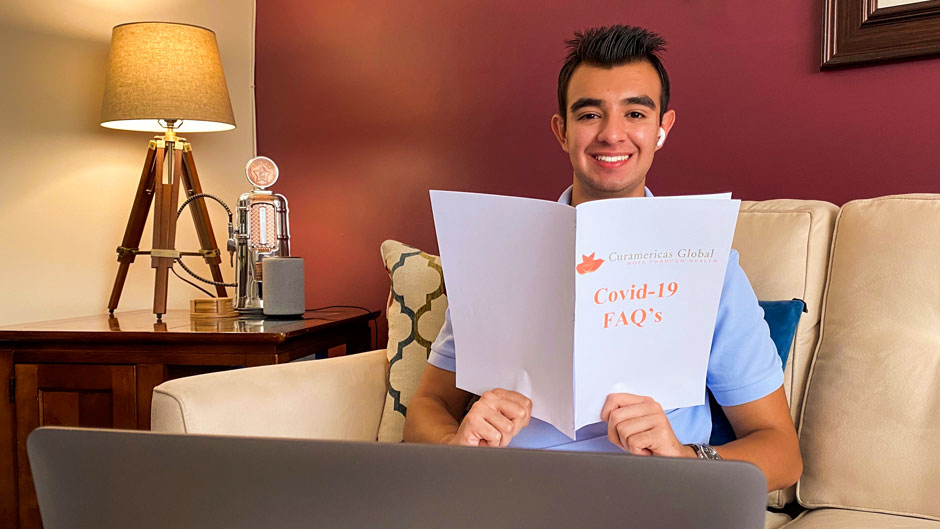She can’t read or write and, after recovering from COVID-19, the young mother from Guatemala was having trouble finding domestic work again in North Carolina. Like so many of the dozens of Spanish-speaking immigrants University of Miami junior Nicolas Hernandez calls every week, her biggest worry was feeding her daughter.
It would take nearly a dozen more phone calls, but Hernandez was able to give the woman news that lightened her burden. He had located a food pantry in her ZIP code that would provide both mother and child with weekly groceries.
For Hernandez, a public health student in the School of Nursing and Health Studies who wants to be a physician, the woman’s palpable relief was reward enough for the 10 hours a week he has spent since mid-May volunteering for Curamericas Global. To date, the nonprofit dedicated to reducing maternal and child mortality around the world has provided accurate information about the novel coronavirus to more than 10,000 Hispanic families in the Carolinas—about a thousand of whom Hernandez has personally contacted while social distancing in his parents’ home in Miami.
“I’ve learned a lot about the power of a simple phone call,” said Hernandez, the son of Colombian immigrants who moved to the United States before he was born. “At the end of the call, a lot of people say, ‘I don’t have any friends or family here, and it’s nice to know that someone out there actually cares.’ ”
Ordinarily Hernandez would have spent this summer shadowing doctors at Jackson Memorial Hospital’s south campus, just as he has every summer since his junior year of high school at Miami’s TERRA Environmental Research Institute. But, after the pandemic forced the hospital to bar non-essential personnel, he jumped at the opportunity to reach out to Spanish-speakers in the Carolinas.
“As a first-generation American, I know how hard my parents’ first years here were because they didn’t know English,” he said. “So, drawing on their experience, I wanted to help these families connect to the resources they need to weather this virus a little bit better.’’
Before he started, Hernandez wasn’t aware of the Carolinas’ Hispanic population, many of whom are food industry, agriculture, or domestic workers. Nor was he familiar with Curamericas. But as a public health student in Miami, he was very familiar with the kind of health disparities that last year prompted the nonprofit to partner with the new Guatemalan Consulate in Raleigh, N.C., to provide more than 100,000 Guatemalans in the region with better access to health care. He’s also aware that the pandemic is exacerbating those disparities.
“Even though the Hispanic population there is a lot smaller, they make up almost half of the COVID-19 cases and are the ones suffering most from chronic diseases and not having health insurance or access to doctors on a regular basis,” Hernandez said. “These are not just issues in a textbook, but what people are living day to day.”
Hernandez, who usually makes his calls four days a week around the lunch hour, begins by asking four questions designed to learn what the person he called knows about COVID-19 risks, symptoms, and precautions. From the conversations that usually follow, he is able to ascertain what, if any, services he should try to connect to them.
Like the young mother who had just recovered from COVID-19, many have lost their jobs and worry about their next meal. Usually, Hernandez has a ready solution: After learning where they live, he texts them a list of nearby food banks, soup kitchens, or other food resources. But that option wouldn’t have worked for the young mother, because she told Hernandez, she never learned to read or write, so she wouldn’t understand his message.
After nearly a dozen more phone calls, Hernandez was elated to find a food bank that could help her. And now, knowing his calls can make a difference, he plans to keep making them even though the Fall 2020 semester began this week.
“As long as the program is ongoing, I’ll keep calling,” he said. “Classes have started. But I can still find an hour or two, three times a week, to continue making them.”
But not on Tuesdays—that’s when he’s packing and distributing food for Big Brothers Big Sisters of Miami. Like the mother of his Little Brother, or mentee, who lost her job in the cruise industry, many of the organization’s members have lost their jobs and need help feeding their families.

